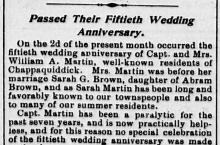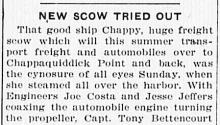The state department of Fishers, Wildlife and Environmental Law Enforcement announced yesterday that it has taken ownership of the Leland beach - 100 acres of virtually unspoiled barrier beach stretching from Wasque to the Dike Bridge on Chappaquiddick.
Purchase price is just under $1 million; the beach, which has been owned by the family of the late Oliver and Edmund Leland since 1907, was purchased through land-taking measures under the state’s eminent domain laws.
“This acquisition completes the protection of a very fragile and important barrier beach system,” said state Fish and Wildlife Commissioner John Phillips in a press release issued yesterday afternoon.
The Leland beach was targeted for purchase by the state some three years ago and talks with the owners have been under way since then. Original plans called for a traditional purchase and sale agreement with the Leland family, but a maze of title problems on the property forced the sale into the eminent domain process, state officials said yesterday.
The Leland beach is a long, rolling ribbon of sand which divides Poucha Pond and the Atlantic Ocean; the beach includes tern nesting sites and provides habitat for the piping plover, a species listed as threatened by both the state and federal governments. The beach embraces the northern portion of Wasque Point, renowned as one of the finest blue-fishing spots in the world. Poucha Pond is also the natural nursery for the pristine bay scallop beds of Cape Pogue Pond, the richest bay scallop beds on the East Coast.
The Leland beach has a mile and a half of frontage on the Atlantic Ocean and 1.2 miles of frontage on Poucha Pond. The beach connects the 500-acre Cape Pogue Wildlife Refuge on the north with the 200-acre Wasque Reservation on the south - both are owned by the Trustees of Reservations, the oldest private land trust in the world. Although it is privately owned, the Leland family beach has historically been open to the public.
Now that tradition will remain intact.
“It sometimes takes a little time and a lot of dialogue to work out all these issues, and we are going to be looking at the management plans as fitting all the pieces together,” said Randy Fairbanks, former assistant director of the Division of Marine Fisheries who worked closely with the Leland acquisition project. The Division of Marine Fisheries is the arm of the state Fish and Wildlife department which is responsible for the beach purchase. “One of the primary reasons for the acquisition is to provide continued access for fishermen,” said Mr. Fairbanks.
Mr. Phillips said: “The area represents some of the finest shore-based saltwater fishing on the entire East Coast and serves as critical habitat for a host of dependent wildlife, including rare species.”
The state has an agreement with the Trustees for management of the property. The Trustees have managed and maintained the Leland beach for many years in cooperation with the Leland family. Late last spring the Trustees and the Lelands formalized the arrangement, with both sides signing an agreement for the Trustees to manage the property.
At one time the Trustees were involved in plans to buy the Leland beach; in the summer of 1989 they revealed a gentleman’s agreement with the Leland family which was expected to lead to a purchase and sale agreement. But negotiations later collapsed when the two sides could not agree on issues of access for the Leland family. A short time later the state stepped in and began taking steps toward a purchase.
A detailed appraisal process was completed earlier this ear. The purchase will involve heavy participation by the federal government through the U.S. Fish and Wildlife Service - 75 per cent of the cost will be reimbursed under the 1984 Wallop-Breaux amendments to the Sport Fish Restoration Act of 1950.
Mr. Fairbanks said the purchase is an important one, both for the state and for the Vineyard. He said: “We’re very excited about it; it’s a unique property and hopefully now it is going to be preserved in perpetuity for a whole range of uses. The people on the Island should also be excited about this. This is not the kind of landscape you can duplicate.”










Comments